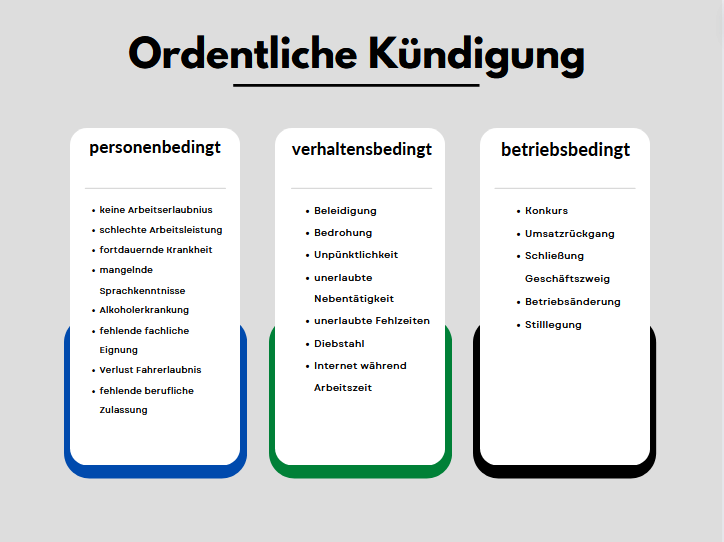Regional Labour Court Cologne, 11.07.2019, Ref. 6 Sa 663/18
If the termination of an employment relationship is invalid, the employee is entitled to continued employment and therefore also to their salary. If the employee is on sick leave beyond the date of the invalid dismissal, they only have to start working again from the date of recovery. However, he is then also entitled to work. In principle, the employer must then also accept the work of his employees, as otherwise he is in default of acceptance according to §§ 293 ff. BGB. Default of acceptance means that the employer does not fulfil its obligation to accept the work of its employees on time. To this end, the employees must actually offer their work to the employer in accordance with Section 294 BGB. If they fail to do so, the employer is not in default. If the employer is not in default, the employee is not entitled to certain benefits (e.g. continued payment of wages without work). If an employee recovers after an illness, the employee must therefore accept the work again.
But what happens if he does not inform his employer that he is healthy again, i.e. the employer does not know that his employee has recovered? Is the employee still entitled to a wage even though he is not working?

In the following judgement, the Cologne Regional Labour Court (LAG Köln) clarifies that the employer must assign work to the recovering employee in order not to be in default of acceptance. The employee does not have to offer his work again himself. This applies all the more if the employee is Ruling of the Federal Labor Court has asserted his right to continued employment and thus expressed his willingness to work.
Facts of the Case::
In the present case, the parties are in dispute over an employee's wage claim. The plaintiff is the employee and the defendant is her employer.
Employee did not report her recovery to the employer
The employee has been employed by her employer since 1989, but is dismissed in October 2014 with effect from 31 May 2015. On 8 November 2014, the employee is put on sick leave until 7 June 2015. She takes legal action against the dismissal and is upheld, rendering the dismissal invalid. On the day after the end of her sick leave (8 June 2015), she does not notify her employer that she is fit for work again. She receives unemployment benefit from 8 June 2015 to 14 April 2016 and works for another employer from 15 April 2016 to 31 August 2014. She has no earnings at all in September 2016 and starts another job in October.
Employee sues employer for payment
She is now taking legal action against her original employer before the Aachen Labour Court and is demanding payment of remuneration for the period from June 2015 up to and including September 2016, less interim earnings from other employers and unemployment benefit. She argues that she was ready to work again from 8 June 2015 and that the employee did not accept her work. The employer was therefore in default of acceptance, even without an explicit notification of her ability to work. She is claiming a total of approximately €12,500 less the unemployment benefit of approximately €5,500.
The employer requests that the claim be dismissed as the employer did not report her fitness for work, which it should have done. It argues that it cannot accept performance from the employee if it is unaware of her ability to work. The fact that the employee did not work in September 2016 constitutes a malicious omission of other earnings within the meaning of Section 615 sentence 2 BGB.
Aachen Labour Court ordered employer to pay
The Aachen Labour Court largely upholds the claim and orders the employer to pay just under € 11,700 for the period from 8 June 2015 to 31 August 2016. For September 2016, it assumes a malicious omission of other earnings, which is why the employer does not have to pay in accordance with Section 615 sentence 2 BGB.
The employer is appealing against this to the Cologne Higher Labour Court, as it considers the judgement of the Aachen Labour Court to be legally incorrect. It is also of the opinion that the employee should have made an express offer of employment following an invalid dismissal. According to the basic idea of Section 615 sentence 2 of the German Civil Code (BGB), the failure to report recovery should be understood as a malicious omission. Should this not apply, such a notification should in any case have been made in accordance with the principle of good faith. It therefore requests that the judgement be set aside and the action dismissed.
Employer files an appeal
The employee requests that the appeal be dismissed.
Judgement of the Regional Labour Court of Cologne:
The Cologne Higher Labour Court considers the decision of the Aachen Labour Court to be correct and dismisses the appeal. It explains in detail why the law was correctly applied.
Firstly, it elaborates that the work performance is a fixed debt and has become objectively impossible due to the inability to work in accordance with Section 275 I BGB. Accordingly, the employee would in principle have no claim due to Section 326 I BGB.
From §§ 611a II, 615 p. 1, 293 ff. BGB, however, it follows from the principle that the employee's claim exists for the period from 8 June 2015 to 31 August 2016, as the employer was in default of acceptance.
In the period from 1 June 2015 to 7 June 2015, this claim did not yet exist due to the employee's inability to work. The employer is not in default due to Section 297 BGB, as it should not be held responsible for the employee's inability to work.
However, the employer was in default of acceptance from 8 June 2015, i.e. from the employee's recovery. The employer is therefore in default pursuant to Section 293 BGB if it does not accept the service offered to it. In principle, the employer would have had to offer her services in accordance with Section 294 BGB, i.e. appear at work on 8 June 2015. She did not do this.
According to Section 296 BGB, however, such an offer by the employee is exceptionally dispensable if an action by the employer is necessary for the performance of the work and a time is determined for this action according to the calendar. Such an action determined by a time in the calendar for the employer is the assignment of the employee to a workplace and the provision of work materials. It should have taken these necessary actions from 1 June 2015 (as the day after the invalid dismissal). The fact that the employee was only able to return to work from 8 June 2015 does not change this.
The delay therefore occurred on 8 June 2015. In the opinion of the court, the employee was also not required to indicate the end of her incapacity to work. The objective resumption of the ability to work is sufficient in the case of an ineffectively terminated employment relationship. Sections 296 and 297 BGB do not depend on the employer's knowledge of the employee's ability to work.
Employee has shown her willingness to work by filing an action against dismissal
In addition, the employee expressed her willingness to work by filing the action against dismissal, as she wanted the employment relationship to continue. The court ruled that if there is a clear willingness to work, the actual ability to work does not have to be indicated. The employer should therefore have assigned work to the employee on its own initiative. She did not do so and was therefore in default of acceptance. The Cologne Higher Labour Court thus agrees with the case law of the Federal Labour Court (BAG of 19 April 1990 - 2 AZR 591/89 - BAGE 65, 98-105) and explicitly points out that it sees no need to deviate from this case law.
The employer must therefore pay the employee remuneration for the period from 8 June 2015 to 31 August 2016 in the amount of just under € 11,700 less unemployment benefit. If you need help with labour law, please contact a Lawyer for labour law.
Source: Regional Labour Court Cologne
Important Note: The content of this article has been prepared to the best of our knowledge and belief. However, due to the complexity and constant evolution of the subject matter, we must exclude liability and warranty. Important Notice: The content of this article has been created to the best of our knowledge and understanding. However, due to the complexity and constant changes in the subject matter, we must exclude any liability and warranty.
If you need legal advice, please feel free to call us at 0221 - 80187670 or send us an email at or send an email to info@mth-partner.de info@mth-partner.de


